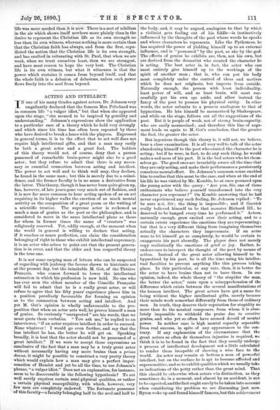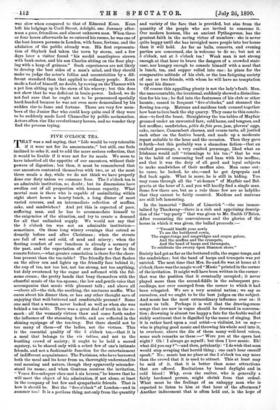ACTING AND INTELLECT.
IN one of his many tirades against actors, Dr. Johnson very ungallantly declared that the famous Mrs. Pritchard was in common life " a vulgar idiot," but that when she appeared upon the stage, " she seemed to be inspired by gentility and understanding." Johnson's expressions show the application to a particular case of a theory which he held very strongly and which since his time has often been repeated by those who have desired to break a lance with the players, Expressed in general terms, it is to the effect that to act well does not require high intellectual gifts, and that a man may easily be both a great actor and a great fool. The holders of this theory would not, of course, deny that a person possessed of remarkable brain-power might also be a good actor; but they refuse to admit that there is any neces- sary or essential connection between acting and intellect. The power to act well and to think well may, they declare, be found in the same man ; but this is merely due to a coinci- dence, and the former faculty is in no sense a derivative from the latter. This theory, though it has never been quite given up, has, however, of late years gone very much out of fashion, and it is now far more common to hear acting spoken of as an art requiring in its higher walks the exertion of as much mental activity as the composition of a great poem or the writing of a scientific treatise. The supreme actor is reckoned as much a man of genius as the poet or the philosopher, and is considered to move in the same intellectual plane as those for whom in former times the name of " creators " was religiously reserved. Yet, oddly enough, at the moment when the world in general is willing to declare that acting, if it reaches or nears perfection, can claim the consideration belonging of right to those who exhibit intellectual supremacy, it is an actor who arises to point out that the present genera- tion is in error, and that the older and less respectful theory is the true one.
It is not some carping man of letters who can be suspected of regarding with jealousy the favour shown to histrionic art at the present day, but the inimitable M. Got, of the Theatre Francais, who comes forward to lower the intellectual estimation in which his profession is now held. No one who has ever seen the oldest member of the Comedic Francaise will fail to admit that he is a really great actor, or will refuse to agree that his fifty years' experience places him in 'a position peculiarly favourable for forming an opinion as to the connection between acting and intellect. And yet M. Got's opinion is wholly unfavourable to the pro- position that when an actor acts well, he proves himself a man of genius. So curiously "'unexpected" are his words, that we must quote them verbatim. " You ask me," he replied to an interviewer, " if an actor requires intellect in order to succeed. None whatever ! I would go even further, and say that the less intellect he has, the better he will get on. Speaking broadly, it is best that the actor should not be possessed of a great intellect." If we were to accept these expressions as conclusive of the fact that a man may be a truly great actor without necessarily having any more brains than a prima donna, it might be possible to construct a very pretty theory which would explain how a man may give a perfect imper- sonation of Hamlet and yet be all the time, to use Johnson's phrase, " a vulgar idiot." Does not an explanation, for instance, seem to be discoverable in the following hypothesis P To act well surely requires certain semi-physical qualities, or rather a certain physical susceptibility, with which, however, very few men are completely endowed. The fortunate possessor of this faculty—a faculty belonging half to the soul and half to the body, and, it may be argued, analogous to that by which a violinist gets feeling out of his fiddle—is instinctively influenced by the thoughts of the poet whose words he speaks and whose characters he represents. Like the Pythoness, he has acquired the power of yielding himself up to an external influence, and is " possessed " by the poet, as she by the god. The effects of genius he exhibits are, then, not his own, but are derived from the dramatist who created the character he is acting. The best actor is, in fact, the actor who can most entirely give himself up to the workings of the spirit of another man ; that is, who can put his body most completely under the control of ideas and motives which he does not originate, but imports from outside. Naturally enough, the person with least individuality, least power of will, and so least brain, will most suc- cessfully put his own ego aside, and allow instead the fancy of the poet to possess his physical entity. In other words, the actor submits to a process analogous to that of hypnotism. He lets himself be mesmerised by Shakespeare, and while on the stage, follows out all the suggestions of the poet. But it is people of weak, not of strong brain-capacity, who are easily mesmerised ; and therefore this line of argu- ment leads us again to M. Got's conclusion, that the greater the fool, the greater the actor.
But ingenious though this theory is, it will not, we believe, bear a close examination. It is all very well to talk of the actor abandoning himself to the poet who created the character he is acting; but if he were, in fact, to do any such thing, he would make a sad mess of his part. It is the bad actors who let them- selves go. The good ones are invariably aware all the time that they are only acting, and make their performance a persistently conscious mental effort. Dr. Johnson's common-sense enabled him to realise that this must be the case, and when at the end of his life he was visited by Mr. Kemble, he at once pounced upon the young actor with the query : "Are you, Sir, one of those enthusiasts who believe yourself transformed into the very character you represent ?" On Kemble answering that he had never experienced any such feeling, Dr. Johnson replied : ".To be sure not, Sir; the thing is impossible ; and if Garrick really believed himself to be that monster Richard III., he deserved to be hanged every time he performed it." Actors, naturally enough, grow excited over their acting, and to a certain extent experience the emotions they are representing; but that is a very different thing from imagining themselves actually the characters they impersonate. If an actor were to let himself go so completely, he would be certain to exaggerate his part absurdly. The player does not merely copy realistically the emotions of grief or joy. Rather, he endeavours to interpret the thought of the poet by means of action. Instead of the great actor allowing himself to be hypnotised by his part, he is all the time using his intellec- tual faculties to prevent anything like this process taking place. In this particular, at any rate, then, it is better for the actor to have brains than not to have them. In our opinion, indeed, the whole theory of " the stupider the man, the better the actor," rests upon a misapprehension of the difference which exists between the several manifestations of the human intellect. The great actors have got a name for being without 'the higher intellectual gifts, merely because their minds work somewhat differently from those of ordinary men. In truth, they deserve their reputation for stupidity no more than do the musical composers, from whom it is abso- lutely impossible to withhold the praise due to creative genius, and who yet so often have seemed devoid of mental power. In neither case is high mental capacity separable from real success, in spite of any appearances to the con- trary. If any explanation of the circumstance that the great actors so often do themselves injustice is required, we think it is to be found in the fact that they usually undergo a process of intellectual development not a little calculated to render them incapable of showing a wise face to tke world. An actor may remain at bottom a man of powerful intellect, but on the surface he is apt to become affected and supersensitive, and so to exhibit qualities which we usually take as indications of the petty rather than the great mind. That this should be otherwise when actors win distinction, as they sometimes do, in a moment, and almost by an accident, is not to be expected, and the fact ought surelyto be taken into account when considering the problem we are discussing just now. Byron woke up and found himself famous, but this achievement was slow when compared to that of Edmund Kean. Kean left his lodgings in Cecil Street, Ade1phi, one January after- noon a poor, friendless, and almost unknown man. When three or four hours afterwards he re-entered his rooms, he was one of the best-known persons in London, with fame, fortune, and the adulation of the public already won. His first representa- tion of Shylock had taken the town by storm, and a few days later a visitor found " his sordid mantlepiece strewn with bank-notes, and his son Charles sitting on the floor play- ing with a heap of guineas." Such experiences are not likely to develop the best sides of a man's mind, and they should make us judge the actor's follies and eccentricities by a dif- ferent standard than that applied to ordinary people. Kean made a fool of himself, no doubt, by rowing on the Thames with a pet lion sitting up in the stern of his wherry; but this does not show that he was deficient in brain-power. Indeed, we do not feel sure that he ought not to be pronounced specially hard-headed because he was not even more demoralised by his sudden rise to fame and fortune. There are very few mem- bers of the Junior Bar who could keep quite cool if they were to be suddenly made Lord Chancellor by public acclamation. Actors often rise like revolutionary heroes, and no wonder they find the process trying.



































 Previous page
Previous page